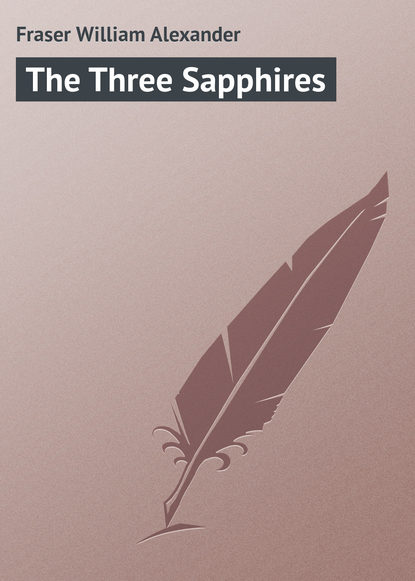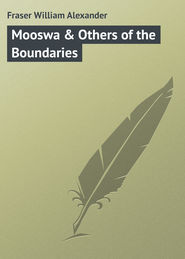По всем вопросам обращайтесь на: info@litportal.ru
(©) 2003-2024.
✖
The Three Sapphires
Автор
Год написания книги
2017
Настройки чтения
Размер шрифта
Высота строк
Поля
Swinton, who was watching the German's eyes, felt that they were passing some hidden meaning to the prince.
"Rikaz means a mine," Doctor Boelke continued; "a place vhere stones or metal are found; dot's all."
Swinton intercepted the stone on its way back, and after examining it passed it on.
"Dot is a big sapphire, major," Boelke said; "vhere did you get it? And for vat is der hole on der other end from der inscription?"
"It's a curious story," Finnerty answered. "A jungle hethni– female elephant – came down out of the forest and walked right in on us, by Jove! I'll describe Burra Moti; that's what we call her, the Big Pearl. She's a female with large tusks; she has four toes on each hind foot, and I haven't another elephant that has more than three. She's different in other ways; has two fingers on the end of her trunk instead of one; she has immense ears and a hollow back; she never lies down."
Doctor Boelke leaned forward, adjusted his big glasses, and said: "My friend, you haf described an African elephant."
"Yes," the major answered; "that's what Burra Moti is."
"I admit it's some mystery," Finnerty said slowly; "it has bothered me. All I know is that Burra Moti, who is undoubtedly an African, came down out of the jungle to the keddah because she was going to calve. What taught her that she'd be safe with her calf in the keddah I don't know; where she came from I don't know. Around her neck was a strap of sambur skin to which was attached a bell, and morning and evening, at a certain hour, Burra Moti would reach up with her trunk and ring the bell. Last evening the mahout didn't hear it at the usual hour – eight o'clock – so he went down to where Burra Moti stood under a big tamarind tree and found a native – looked to be a hillman – crushed flat where she had put her big foot on him. Beside him lay the bell, and the strap had been cut with a sharp knife. The bell was flattened out of shape, Moti in her rage evidently having stepped on it. The clapper of that bell was this sapphire, hung by the little hole in the end."
"By Jove!" Lord Victor ejaculated. "My gov'nor would give a few sovs for that Sapphire; he's entirely daffy on the subject of Indian curios."
"If it's for sale I'll give a thousand rupees for it, major," the prince added.
"I've got to fix that bell up again for Burra Moti," Finnerty answered; "she's been in a towering rage all day – keeps slipping her trunk up to her neck like a woman looking for a necklace she has lost."
"Oh, I say!" Gilfain expostulated. "Rather tallish order, old chap, don't you think? Almost too deuced human, what?"
Major Finnerty turned in his leisurely way to Gilfain: "If a chap spends several years with elephants he'll come devilish near believing in reincarnation, my young friend." Then, addressing Darpore more particularly, he added: "I want to tell you one extraordinary thing Burra Moti did when her calf was born. The little one was as though it were dead, not breathing. With her front foot the mother pressed the calf's chest in and out gently – artificial respiration if you like, gentlemen – and kept it up until the calf breathed naturally. But I'm sorry to say the little one died next day."
Swinton waited for some comment on the sapphire-clappered bell. He now asked: "Do you suppose, major, it was just a bell that the thief wanted?"
"No; that native had never been seen around the lines before. It's not likely he would slip into a strange place and take chances of being killed for a thing of not much value – a bell."
"Perhaps it's one of those bally sacred things," Lord Victor interjected.
Swinton saw Ananda's eyes send a swift glance to the German's face.
"Well," Finnerty said meditatively, "I think the thief knew of the sapphire stone in that bell, and it may have belonged to some temple; I mean Burra Moti may have been a sacred elephant."
"If that were the case," Darpore objected, "they'd come and claim the elephant."
"The stone being in the rough, there must be a mine near where the elephant was equipped with the bell," Swinton suggested.
"I had an idea," Finnerty said, "that if I rode Burra Moti off into the jungle and let her drift she might go back to where she came from; I might find the mine that way."
As Finnerty ceased speaking the high-pitched voice of a woman singing floated down to them from higher up on the hill. Ananda clapped his hands; a servant slipped from a door in the palace, and, salaaming deeply, listened to an order from the prince. When he re-entered the palace the row of lights that had illumined the terrace went out, leaving the sitters in the full glamour of a glorious moon.
Ananda made a gesture toward the hill from which the weird chant came. "That is the Afghan love song," he explained. "The girl represents a princess who was in love with a common soldier. After a great battle she went out on the plain, searching for him among the wounded and slain; so now this girl will come down in her singing search."
The listeners could now make out the weird music of the many-stringed fiddle that a companion played as accompaniment to the girl's voice. The prince swept his hand toward the great disk of silver that had lifted above the sal trees, saying: "My people believe that luminous, dead planet up there is the soul, purusha, of Brahm the Creator; fitting light for the path of a princess who is singing out of the desolation of her soul."
Nearer and nearer came the wailing plaint of the girl looking for her dead soldier. Once its vibrant tone stirred the leopard in his cage, and he called: "Wough-wa, wough-wa, wah!"
"That's 'Pard's' mating call," the prince explained. "Even he, jungle devil, feels something in that love song – in the sorrowing voice that does not anger him."
A peacock, wakened from his sleep by the leopard, sent out a warning call to jungle dwellers that a killer was afoot. "Meough, meough, meough!" he cried in shrill discordancy.
The song of love-search drifted in from the sal trees, through the mango tope beyond the palace, along the banks of the Lake of the Golden Coin, and up the ghat steps to the terrace.
In the moonlight the girl's face, as she came slowly up the steps, was beautiful; her grace of movement was exquisite. Followed by the musician, she passed along the terrace with no notice of the prince or his guests. At the far end, she dropped to her knees beside a figure that had lain there – her slain soldier lover. She lifted his head into her lap, and the song rose in an intensity of lament; then it died down to a croon; the desolate woman's head drooped until her luxuriant hair shrouded the soldier's face. Suddenly the crooning chant was stilled; the girl's face thrust up through its veil of hair, and the eyes, showing a gleam of madness in the moonlight, swept the vault above.
"She has become crazed by the death of her lover," the prince explained softly. As the girl commenced a low chant he added: "She now asks of the gods what she must do to receive back his life. She thinks, in her madness, they answer that if she dances so that it pleases Krishna the soldier will be restored to life."
Tenderly the girl laid the head of her lover down, kissing him on the staring eyes, and then commenced a slow, sinuous dance, the violin, with its myriad wire strings, pulsating with sobs. The soft, enveloping moon shimmer lent a mystic touch of unreality to the elfin form that seemed to float in rhythmic waves against the dark background of the sal forest. Faster and faster grew the dance, more and more weird the wail of the violin, and the plaint from the girl for her lover's life became a frenzied cry. Now she had failed; her strength was gone; death still held in its cold fingers the heart of her lover; she reeled in exhausted delirium, but, as she would have fallen, the lover rose from death and caught her to his breast.
But the gift of the gods – his life – had been but transitional – a bitter mockery – for the princess lay dead against his pulsing heart. Smothering the unresponsive eyes and lips with kisses, he gently placed the girl upon the ground, and, standing erect, defied the gods – called them to combat.
Prince Ananda interpreted the words and gestures of the gladiator as the moonlight painted in gold and copper his bronze form.
In answer to his challenge a sinister form glided from the shadow of the wall.
"Bhairava, the evil black god, who rides abroad at night," Ananda explained, adding, as the combat began: "They are two Punjabi wrestlers. The lover is Balwant Singh, which means 'Strong Lion;' Bhairava, whom you see is so grotesquely painted black, is Jai Singh, 'Lion of Victory.'"
The struggle was Homeric, as Balwant Singh, the muscles on his back rising in ridges, strove to conquer the black god. In vain his strength, for the god, sinuous as a serpent, slipped from the lover's grasp with ease. At last Jai Singh's black arm lay across the lover's throat, anchored to the shoulder by a hand grip; there was a quick twist to the arm, a choking gasp from Balwant Singh, and, with startling suddenness, he was on his back, both shoulders pinned to the mat.
The tragic drama was at an end. The lover, slain by the gods he had defied, lay beside his dead princess.
"Ripping!" Lord Victor cried. "In Drury Lane that would cause no end of a sensation as a pantomime. Hello! By Jove! I say!"
For even as the young man cackled, some heavy shadow, some mystic trick of the Orient, had faded from their eyes the three figures of the drama.
Prince Ananda, with a soft laugh at Gilfain's astonishment, said: "Bharitava, the evil god, has spirited the lover and the princess away."
"My friends, dot to me brings of importance a question," Doctor Boelke commented. "How is it dot a few Englishmen rule hundreds of millions, and we see dot der Hindus are stronger as der white man; no Englishman could wrestle those men."
"I fancy it's hardly a question of what we call brute force where England governs," Swinton claimed.
"Oh, of course!" And Doctor Boelke laughed. "England alvays ruling people because of philanthropy. Ah, yes, I hear dot!"
"Do you mean to say, sir" – and Lord Victor's voice was pitched to a high treble of indignation – "that we have no wrestlers at home as good as these Hindu chaps? Damn it, sir, it's rot! A man like Fitzalban, who was at Oxford in my last year, would simply disjoint these chaps like wooden dolls."
The doctor puffed his billowy cheeks in disdain, and Finnerty contributed: "Don't underrate these Punjabi wrestlers, my young friend; there are devilish few professionals even who can take a fall out of them."
"The major should know," and Darpore nodded pleasantly; "he has grappled with the best that come out of the Punjab."
Gilfain, his spirit still ruffled by the Prussian's sneer at England, declared peevishly: "I wish there was a chance to test the bally thing; I'd bet a hundred pounds on the Englishman, even if I'd never seen him wrestle."
Boelke, with a sibilant smack of his lips, retorted: "You are quite safe, my young frient, with your hundred pounds, because, you see, there is no Englishman here to put der poor Hindu on his back."
"I'm not quite so sure about that, Herr Doctor."
Boelke turned in his chair at the deliberate, challenging tone of Finnerty's voice. He looked at the major, then gave vent to an unpleasant laugh.








